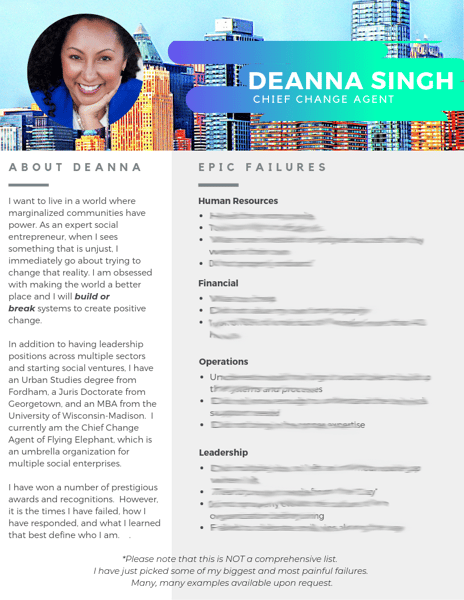This week's Failsume mistake is called "Are you a Hard worker or a smart one?" and it's associated with Sade's "Smooth Operator." The smooth operators have streamlined their operation to maximize productivity.
A Failsume is a list of all my failures and mistakes throughout my career. The purpose of sharing this information is for you to learn what to avoid when faced with the same situations.
I have never had a problem with working hard.
I am a hard worker. I love to work because I love to be able to accomplish big things and I like putting my best foot forward. It took me a really long time to realize working hard didn't necessarily equate to working smart or, to be honest, to doing good work. There was a difference between hard work and good work or work that was moving me forward. You can work really hard at things that aren't helping you progress and help your mission.
I had to spend time learning how to unlearn the idea of just working hard, and instead learn how to work smart. One of the things that was most helpful for me in going through that process was trying to figure out what I could systematize and what I could put into an operational kind of function so I didn't have to worry about it.
This may sound strange to some because they are not factory workers and their days are all unique. I understand. My days are incredibly eclectic, but when I took a hard look at some of the things I was doing, I realized there were some things that were pretty routine.
If I automated some things, I could make more time to be productive. Let me give you a couple of examples of some of the things that I have operationalized in my life.
AUTOMATION EXAMPLE #1 - the gym
Laying out my gym clothes may sound goofy, but guess what? I am 90% more likely to go to the gym if all my clothes are in the right spot when it's time for me to get dressed. After I come home from the gym, I put all of my stuff in the laundry before I get into the shower, and I also make sure I lay out all I need for the next workout. From the tips of my toes to the top of my head, I put out every single thing.
automation example #2 - EMAILS
I've automated emails. It's much simpler than you might think. There are emails I respond to on a regular basis so I've created a swipe file. In my swipe file, I keep regular emails I'm sending frequently and I'm able to pull those out. I have to make some adjustments and changes. Instead of spending 15 minutes on an email, I'm only write for 10 minutes.
automation example #3 - groceries
I automated my grocery list. How often are you going to the grocery store and trying to remember what's needed? I created a list of all the staples we needed in the house, so before anybody goes to the grocery store, they take that list, go through our cupboards, and go through the refrigerator and see if we have everything on the list. Why is my grocery store list hack so awesome? We're not duplicating all the stuff we have in our house.
the challenge
Many times we're doing things and we've created these routines, but we haven't spent the time to think about how we could make the routines more efficient. I want to challenge you to take just 15 minutes to think about all the things occupying your time. Maybe it's packing your car for a trip or making sure that you have the information that you need for your next sales meeting. Then I want you to implement those ideas. The need to think about these ordinary things is so interesting.
If you make the time to operationalize and automate the ordinary, it leaves more room for the extra-ordinary!
THE FAILSUME

Editor's Note: This post was originally published in October 2019 and has been updated for accuracy and comprehensiveness.








Leave a Comment